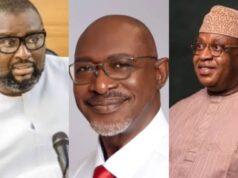 Nigeria’s next general elections might still be two years away but there’s already a good reason for young citizens to be excited.
Nigeria’s next general elections might still be two years away but there’s already a good reason for young citizens to be excited.
In a session on Wednesday (July 26), the Nigerian senate voted to lower the age limit for contesting for elections for the offices of state governors and president. The age limit for candidates for president has been reduced from 40 to 35 and, for governorship positions, from 35 to 30. To take effect, the vote still requires endorsement by 24 of Nigeria’s 35 state assemblies as well as the president’s assent. Regardless, the landmark vote marks a triumph for the “Not Too Young To Run” campaign led by a coalition of youth advocacy groups.
The vote comes at a time when public perception favours a younger generation of leaders with a recent survey by NOIPolls showing that a majority of Nigerians hope to elect a president younger than 50 in the 2019 elections. At 53, Goodluck Jonathan was Nigeria’s youngest president at time of taking office since 1999, the start of the current democratic era.
Nigeria is a particularly young country with a median age of 18. UN predicts that while 2.2 billion people could be added to the global population by 2050, Africa will account for more than half of that growth. Nigeria will account for some of that growth spurt as it is projected to become the world’s third largest country with a population of over 300 million.
The current debacle around the health status of Nigeria’s president Muhammadu Buhari, 74, also serves as a timely reminder to the perils of electing older presidents. Buhari is currently away in London on his second medical leave in 2017 where he’s spending time getting treatment for an undisclosed ailment. The president has spent more time away getting treatment than he’s been at work this year. A photo of president Buhari released earlier this week was the first time he’d been seen in public in nearly three months.
The Senate also voted to allow independent candidates to run for office, reversing a decades-old trend which has required aspirants to be members of political parties, thus needing the backing Nigeria’s political establishment to seek and possibly win votes.
However, running as an independent candidate, while encouraging more participation, is hardly a guarantee of victory as aspirants will still be up against the deep pockets and network of the country’s largest parties. But, if nothing else, the move is seen as bringing local politics in line with global trends. Long-term, the Senate’s votes today will likely further galvanize young Nigerians who, after becoming more involved in politics, have witnessed repeatedly underwhelming governments and may have become cynical or apathetic.
Credit: Quartz








I think it’s time I contest. Lools
Good one. Though we know how things work in Nigeria. It’s on paper, the media has spread the word but these old guys will still make it difficult for the young to make it through.